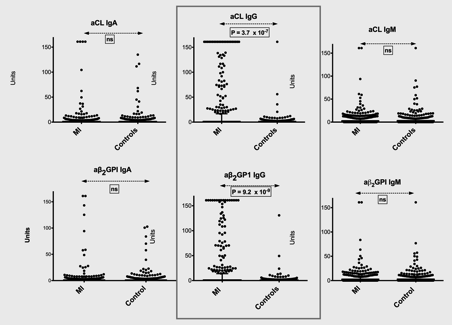Session Information
Session Type: ACR Concurrent Abstract Session
Session Time: 2:30PM-4:00PM
Background/Purpose: The antiphospholipid syndrome (APS) is present when arterial, venous or microvascular thrombosis or obstetric morbidity concur with confirmed positive tests for antiphospholipid antibodies (aPL). Long-term anticoagulation prevents new thrombotic events in most APS patients. Information on the occurrence of pro-thrombotic aPL in myocardial infarction (MI) is conflicting due to limited size, selected populations and/or non-standardized methods in previous studies.
Methods: 805 patients (age <75 years; 6-10 weeks after a first MI) and 805 age- (mean 62± 8 years), sex- (male 81%) and area-matched controls, free from MI, were examined. Associations between aPL positivity [anti-cardiolipin (aCL) and anti-β2glycoprotein-I (anti-β2GPI), IgG, IgM and IgA] and MI were studied by paired statistical analyses (paired Student’s t-test, McNemar´s test). Additionally, aPL positive MI patients and 6 APS patients, defined according to the Sydney criteria, were tested on a peptide ELISA regarding reactivity to specific domains of the β2GPI protein.
Results: Positivity for IgG anti-CL and IgG anti-β2GPI was noted in 10.9% versus 0.9% [p<0.0001 ] and in 10.4% versus 0.9% [p<0.0001) among MI patients and controls respectively, and many MI patients had high IgG titers. aPL of IgM and IgA isotypes did not differ (figure). IgG positivity for anti-CL and anti-β2GPI was highly correlated (rSpearman=0.85) and these antibodies were therefore evaluated combined as aPL IgG positivity (n=88). Using this definition aPL IgG positivity remained associated with MI after adjustment for traditional cardiovascular risk factors (present smoking, hypertension, diabetes and body mass index) [adjusted OR 8.9 (95%CI: 4.6-17.3)]. Anti-β2GPI antibodies from MI patients usually recognized one domain of the β2GPI protein, while antibodies from APS patients targeted several domains.
Conclusion: In a large representative cohort of patients with a first-time MI and matched controls, we report a strong independent association between IgG aPL positivity and MI, suggesting that IgG aPL could be an important risk factor for MI in the general population. If long-term cohort studies can confirm causality for IgG aPL, our results may alter handling, treatment and outcomes for many patients with MI.
To cite this abstract in AMA style:
Grosso G, Sippl N, Kjellström B, Amara K, de Faire U, Elvin K, Lindahl B, Näsman P, Ryden L, Norrhammar A, Svenungsson E. IgG Antiphospholipid Antibodies, -a Common but Neglected Finding in Patients with Myocardial Infarction [abstract]. Arthritis Rheumatol. 2018; 70 (suppl 9). https://acrabstracts.org/abstract/igg-antiphospholipid-antibodies-a-common-but-neglected-finding-in-patients-with-myocardial-infarction/. Accessed .« Back to 2018 ACR/ARHP Annual Meeting
ACR Meeting Abstracts - https://acrabstracts.org/abstract/igg-antiphospholipid-antibodies-a-common-but-neglected-finding-in-patients-with-myocardial-infarction/

